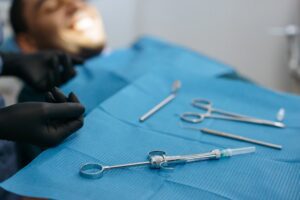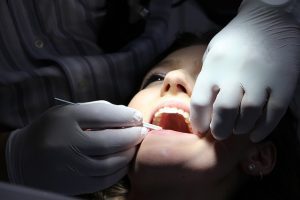In the world of dental specialists, pediatric maxillofacial surgeons deal with some of the most specific, intricate and difficult orofacial issues. Like an oral surgeon is a dental specialist, and a maxillofacial surgeon is an oral surgery specialist, a pediatric maxillofacial surgeon is a maxillofacial surgery specialist. According to ACOMS (American College of Oral and Maxillofacial Surgeons),
“Oral and maxillofacial surgeons are trained to recognize and treat a wide spectrum of diseases, injuries and defects in the head, neck, face, jaws and the hard and soft tissues of the oral and maxillofacial region. They are also trained to administer anesthesia and provide care in an office setting. They treat problems such as the extraction of wisdom teeth, misaligned jaws, tumors and cysts of the jaw and mouth, and to perform dental implant surgery.”
Pediatric maxillofacial surgeons specifically focus on children who fall within this definition. Since children are growing and developing all the time, procedures like bones grafts for wisdom teeth, cleft palate repair or facial trauma surgery are extremely specialized. Treatment plans are often gradual, as they have to develop with the child.
What Training Does a Pediatric Maxillofacial Surgeon Need?
Pediatric maxillofacial surgeons work on everything from infants a few weeks of age, all the way up to kids of about 18. This field of oral medicine is very specific and often involves very delicate, detailed surgical work. An oral surgeon who works with kids has to find solutions that will grow with the child’s body.
This presents challenges, like having to wait until bone growth is finished to replace any teeth with a permanent solution like dental implants. But it also presents opportunities, as the oral surgeon has time to plan ahead and adjust treatment as necessary.
Pediatric maxillofacial surgeons are required to finish the standard 4-year dental school program, followed by 6 years of residency in oral and maxillofacial surgery. Because of its intricate, unique and delicate nature, many surgeons choose to do a short fellowship in pediatric maxillofacial surgery after completing residency.
These oral surgery specialists are trained in:
- Anesthesia/pain management
- Advanced surgical techniques
- Craniofacial surgery
- Facial trauma surgery
- Head/neck cancer surgery
- Orthognathic surgery (jaw surgery)
- Pediatric dentistry
- Pediatric plastic surgery
In addition, there’s an important social aspect to pediatric oral surgery that isn’t as present in adult populations. Parents are (rightfully) worried about a child undergoing surgery, and want to be involved in every step of the process. Maxillofacial surgeons specializing in the pediatric population need to be able to be open, friendly and communicative with parents and their children for treatment to proceed smoothly.
What Do Pediatric Maxillofacial Surgeons Do?
Let’s take a look at the 3 most common types of orofacial surgeries our pediatric maxillofacial surgeon deals with:
Orofacial Deformities: Cleft Lip and Palate Repair
Between 1 in 1600 and 1 in 2800 babies born in the US have a cleft lip and/or palate. This is a congenital defect that can usually be ID’d via an ultrasound during late pregnancy. A pediatric maxillofacial surgeon will usually repair a cleft lip as early as a surgery can safely be performed, as aesthetic healing is better the earlier an orofacial cleft is repaired.
Repairing an orofacial cleft involves cutting into the gums (and bone, in cleft palates), bring the two sides together, and suturing them. If the palate cleft is too large to repair, a surgeon may add a dental bone graft before trying to repair the cleft. Post-surgery, the child must follow a strict feeding schedule/diet and wear a splint/plate while they heal.
A cleft palate will usually be repaired before age 2, depending on the severity. A cleft lip may be repaired just a few weeks after birth. Many of these surgeries include bone and soft tissue work in and around the mouth, and are usually followed by non-invasive treatments like speech therapy.
Preventative Surgery: Wisdom Teeth Extractions
Pediatric maxillofacial surgeons are also the people who usually perform wisdom teeth removal in older children. Wisdom teeth are often extracted before they fully erupt, because most people don’t have the room in their mouths for these huge molars to come in without moving other teeth around.
Wisdom tooth removal surgery is a simple procedure (most of the time). Under twilight anesthesia, the surgeon cuts into the gums to access enough of the wisdom tooth to extract. They then remove the tooth. If there’s an issue like the wisdom tooth’s roots are locked in the jaw or there’s an infection, it gets a bit more complicated. However, typically, you’re stitched right up, sent home, and are good to go just a few days later.
You can get a wisdom teeth extraction at any age, but it’s typically done in late youth/early adulthood. Even though this is a relatively simple procedure, it can quickly be complicated by impaction, root issues and jaw issues, which is why a special wisdom tooth doctor and not a regular dentist performs these procedures.
Orofacial Triage: Surgery to Repair Facial Trauma
Facial trauma surgeries are tricky. Depending on the extent of the facial damage, someone may need simple dental implants for a few missing teeth, or a full mouth reconstruction that includes jaw repair, bone and soft tissue grafting, as well as a lengthy recovery process. Pediatric maxillofacial surgeons specialize specifically in facial trauma in kids, as they need surgical solutions that will grow with them, to avoid more surgeries down the line.
When dealing with facial trauma, the help of other pediatric medical specialists is often needed, as well. For instance, a plastic surgeon might step in to help with a collapsed jaw, or an ENT may assist with damaged sinus structures. Pediatric maxillofacial specialists must understand and work with these specialists on a regular basis.
Wilmington Oral Surgery Offers Pediatric Maxillofacial Services
Dr. Puckett is an oral and maxillofacial surgeon with specializations in pediatric and geriatric populations, and is also fully trained in anesthesia techniques, pain management and sedation dentistry. Questions? Give us a call at 937-382-8020 or schedule an appointment online.










